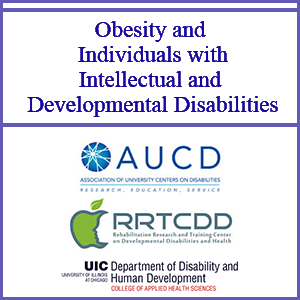Obesity and Individuals with Intellectual and Developmental Disabilities
September 26, 2017

|
| Download & Purchase |
Obesity is an increasingly common condition that is characterized by an increase in the number and size of fat cells in the body. Obesity rates are a concern for the general population, but research findings consistently report even higher rates of obesity among individuals with intellectual and developmental disabilities (IDD). The Centers for Disease Control and Prevention report approximately 35% of the general population is obese, while the rate of obesity among adults with IDD is as high as 58.5% in the United States. The consequences of obesity predispose adults with IDD to a greater risk of secondary health conditions that can impair their health status and quality of life.
Authors
William H. Neumeier, University of Alabama at Birmingham and Lakeshore Foundation Research Collaborative
Christine Grosso, Association of University Centers on Disabilities
James H. Rimmer, University of Alabama at Birmingham and Lakeshore Foundation Research Collaborative
Acknowledgements
Research and Training Center on Developmental Disabilities and Health (RRTCDD)
University of Illinois at Chicago Department of Disability and Human Development
Association of University Centers on Disabilities (AUCD)







